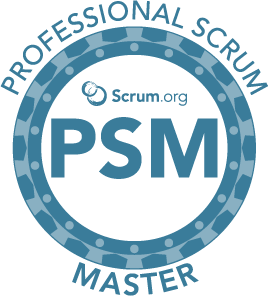-
16 Apr 19 - 17 Apr 19
9:00 am - 5:00 pm
 The Professional Scrum Master (PSM) Course provides information and tools that you can use to ensure that Scrum is understood and enacted well by your team. This course covers Scrum basics, including the framework, mechanics, and roles of Scrum. But it also teaches how to use Scrum to optimize value, productivity, and the total cost of ownership of software products. Students learn through instruction and team-based exercises, and are challenged to think on their feet to better understand what to do when they return to their workplaces.
The Professional Scrum Master (PSM) Course provides information and tools that you can use to ensure that Scrum is understood and enacted well by your team. This course covers Scrum basics, including the framework, mechanics, and roles of Scrum. But it also teaches how to use Scrum to optimize value, productivity, and the total cost of ownership of software products. Students learn through instruction and team-based exercises, and are challenged to think on their feet to better understand what to do when they return to their workplaces.
Ken Schwaber initially designed the PSM course in 2009 as a significant update of the Certified Scrum Master (CSM) course that he created in 2002. Since 2009, the PSM course has been maintained and regularly enhanced by Scrum.org through contributions from Ken and other experts in the Scrum.org network of Professional Scrum Trainers. Scrum.org maintains the defined curriculum and materials for the Professional Scrum Master course and selects only the most qualified instructors to deliver this course. Each instructor brings his or her individual experiences and areas of expertise to bear, but all students learn the same core course content. This improves their ability to pass the Professional Scrum Master assessments and apply Scrum in their workplaces.
Audience
The Professional Scrum Master course is specifically targeted to Scrum Masters, but the lessons are applicable to anyone in a role that supports a software development team’s efficiency, effectiveness, and continual improvement. If you are responsible for the successful use and/or rollout of Scrum in a project or enterprise, this course is likely to be a good fit.
PSM Syllabus
This two-day course covers the following:
- Scrum Basics. What is Scrum and how has it evolved?
- Scrum Theory. Why does Scrum work and what are its core principles? How are the Scrum principles different from those of more traditional software development approaches, and what is the impact?
- Scrum Framework and Meetings. How Scrum theory is implemented using time-boxes, roles, rules, and artifacts. How can these be used most effectively and how can they fall apart?
- Scrum and Change. Scrum is different: what does this mean to my project and my organization? How do I best adopt Scrum given the change that is expected?
- Scrum and Total Cost of Ownership. A system isn’t just developed, it is also sustained, maintained and enhanced. How is the Total Cost of Ownership (TCO) of our systems or products measured and optimized?
- Scrum Teams. Scrum Teams are self-organizing and cross-functional; this is different from traditional development groups. How do we start with Scrum teams and how do we ensure their success?
- Scrum Planning. Plan a project and estimate its cost and completion date.
- Predictability, Risk Management, and Reporting. Scrum is empirical. How can predictions be made, risk be controlled, and progress be tracked using Scrum. Discussion starts with “Done and Undone” and continues with Quality Assurance in Scrum.
- Scaling Scrum. Scrum works great with one team. It also works better than anything else for projects or product releases that involve hundreds or thousands of globally dispersed team members. How is scaling best accomplished using Scrum?
PSM Assessment and Certification
Unlike other Scrum certifications that require only class attendance, Scrum.org certification requires a minimum score on a rigorous assessment. The Professional Scrum Master course has two associated assessments with two levels of certification: PSM I and PSM II. While these assessments are available to the public for purchase, if you complete the Professional Scrum Master course you will receive a password to take the PSM I assessment one time within a 14-day period following the course. If you pass this assessment you will receive the industry-recognized “PSM I” certification and your name will be posted on the Professional Scrum Master I certification list
Venue: etc Venues, Marble Arch
Description:
Address: Garfield House, 86-88 Edgware Road, London W2 2EA

How to Get There:
By Underground
Central line to Marble Arch Station. When you exit the station, turn right on to Oxford Street and then second right on to Edgware Road. etc.venues Marble Arch is in Garfield House, on the right hand side next to Tesco.
By Train
Paddington Station is approximately 20 minutes walk. Use the Praed Street exit and turn left on to Praed Street and continue until you walk on to Edgware Road. Turn right onto Edgware Road and continue towards Marble Arch. etc.venues Marble Arch is at the other end of Edgware Road on the left. Alternatively bus routes 36 or 436 go from outside Paddington Station on Praed Street and on to Edgware Road and takes approximately 10 minutes to Marble Arch.
By Bus
etc.venues Marble Arch sits on many bus routes including 7, 10, 73, 98, 137, 390, 6, 23, 94, 159, 30, 94, 113, 159, 274, 2, 16, 36, 74, 82, 148, 414, 436
Parking
There is a NCP car park situated within close proximity to Marble Arch – visit www.ncp.co.uk for more details.
By London Cycle Scheme
The nearest “Boris Bike” docking station is on Edgware Road / Marble Arch.